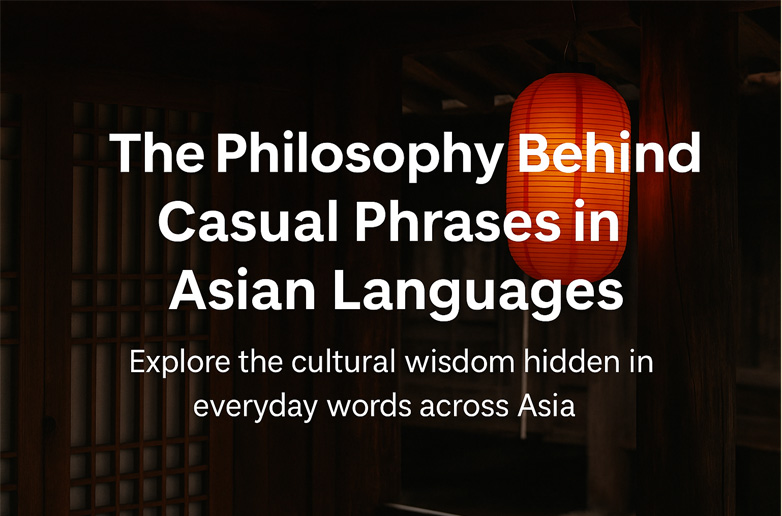We often overlook the simple words we say every day—“thank you,” “sorry,” or “no problem.” But what if these casual phrases actually carry centuries of cultural wisdom? In Asia, where language and philosophy are deeply intertwined, casual phrases reflect profound values—humility, harmony, mindfulness, and respect.
This article explores the philosophy behind casual phrases in popular Asian languages like Japanese, Korean, Chinese, and Thai, revealing how everyday speech subtly mirrors each society’s worldview.
Understanding Language Through Culture
Language is not just a tool for communication; it’s a living reflection of a culture’s values, norms, and philosophy. In Asian societies, where Confucianism, Buddhism, and Taoism have left indelible marks, even casual phrases carry deeper meanings.
“A nation’s language is its soul.” – Confucius (paraphrased)
Here’s how this “soul” shines through in ordinary, everyday talk.
Japanese: Politeness, Impermanence, and Social Harmony
Phrase: “Yoroshiku Onegaishimasu” (よろしくお願いします)
Literal Meaning: “Please treat me well.”
Contextual Use: Said when meeting someone, starting a task together, or making a request.
Cultural Philosophy:
This phrase is not about demanding good treatment. It reflects “wa” (和) — the Japanese value of harmony. It acknowledges interdependence and shared responsibility. There’s also an element of “giri” (duty) and “amae” (dependency/affection), subtle but powerful concepts in Japanese interpersonal dynamics.
Embedded Wisdom:
Even before a task begins, the speaker shows humility and builds mutual respect. It’s a verbal bow to cooperation.
Phrase: “Shouganai” (しょうがない)
Literal Meaning: “It can’t be helped.”
Cultural Philosophy:
This isn’t a shrug of defeat—it’s an echo of Buddhist acceptance and impermanence (mujō 無常). The phrase allows one to let go of control and move forward gracefully, often used during hardship or inconvenience.
Embedded Wisdom:
Acceptance of the uncontrollable is not weakness—it’s strength rooted in spiritual resilience.
Korean: Respect, Age Hierarchy, and Emotional Nuance
Phrase: “Annyeong” (안녕)
Literal Meaning: “Peace”
Use: Informal greeting meaning both “Hi” and “Bye.”
Cultural Philosophy:
The root word “nyeong” (녕) means peace or well-being. Unlike “hello,” it implies a genuine wish for peace—reflecting Confucian values that prize harmony in relationships.
Embedded Wisdom:
Even a casual hello contains a wish for your inner peace.
Phrase: “Aigoo” (아이고)
Meaning: An exclamation of frustration, surprise, or sympathy.
Cultural Philosophy:
“Aigoo” may sound like a simple groan, but it encapsulates empathy, emotional expression, and communal stress relief. Korean culture encourages emotional attunement, especially in family or group settings. This phrase allows people to express shared burdens or minor frustrations communally.
Embedded Wisdom:
You don’t bear stress alone—language helps carry it together.
Chinese (Mandarin): Hierarchy, Face, and Balance
Phrase: “Mǎmǎhūhū” (马马虎虎)
Literal Meaning: “Horse horse tiger tiger”
Actual Meaning: “So-so” or “Not bad”
Cultural Philosophy:
This metaphorical phrase avoids extremes. It reflects Taoist balance—nothing is entirely good or bad. It also serves a social function of humility, avoiding overstatement or pride in a culture that values “face” (miànzi 面子).
Embedded Wisdom:
Balance, modesty, and indirectness are virtues in everyday evaluation.
Phrase: “Bù hǎo yìsi” (不好意思)
Literal Meaning: “Not good meaning”
Use: “Sorry” or “Excuse me” in light situations
Cultural Philosophy:
This polite apology carries more than regret—it’s a softener, a way to express consideration, face-saving, and deference in social interaction. Rather than overt guilt, it reflects the importance of not causing inconvenience or discomfort to others.
Embedded Wisdom:
Preserving social harmony is more important than assigning blame.
Thai: Karma, Sanuk, and Grace
Phrase: “Mai Pen Rai” (ไม่เป็นไร)
Literal Meaning: “It’s nothing” or “Never mind”
Cultural Philosophy:
More than just “no problem,” it reflects Thai Buddhist detachment and grace under pressure. It’s about letting go of ego, avoiding confrontation, and maintaining emotional peace.
Embedded Wisdom:
Letting go is not giving up. It’s choosing peace over pride.
Phrase: “Sabai Sabai” (สบาย สบาย)
Literal Meaning: “Comfort, comfort”
Use: To describe a relaxed, carefree situation or mindset
Cultural Philosophy:
Thailand’s cultural emphasis on “Sanuk” (joy) and “Sabai” (comfort/ease) promotes well-being through emotional balance. This phrase expresses not just comfort, but an intentional pursuit of emotional lightness.
Embedded Wisdom:
Life is better when you flow with it—joy isn’t rushed.
Cultural Comparison Table
| Phrase | Language | Literal Meaning | Hidden Philosophy | Use Case |
|---|---|---|---|---|
| Yoroshiku Onegaishimasu | Japanese | Please treat me well | Harmony, duty, interdependence | Meeting someone, teamwork |
| Shouganai | Japanese | It can’t be helped | Acceptance, impermanence | Adversity, delay |
| Annyeong | Korean | Peace | Interpersonal harmony | Hello/Goodbye |
| Aigoo | Korean | Groan/exclamation | Shared empathy | Frustration, sympathy |
| Mǎmǎhūhū | Chinese | Horse horse tiger tiger | Modesty, balance | Casual evaluation |
| Bù hǎo yìsi | Chinese | Not good meaning | Social harmony, politeness | Light apology |
| Mai Pen Rai | Thai | It’s nothing | Karma, peace, non-attachment | Apology, mishap |
| Sabai Sabai | Thai | Comfort, comfort | Joy, flow, balance | Relaxation, reassurance |
Why These Phrases Matter: Key Insights
-
They Reflect Philosophical Values, Not Just Language
-
Casual phrases in Asia are deeply rooted in centuries-old systems like Confucianism, Taoism, and Buddhism.
-
-
They Maintain Social Harmony
-
Many Asian cultures use indirectness and politeness not to avoid truth—but to preserve relationships and mutual respect.
-
-
They Express Collective Emotion
-
Words like “aigoo” or “shouganai” offer emotional release while aligning with cultural expectations.
-
-
They Teach Emotional Intelligence
-
Understanding these phrases can help you navigate Asian cultures with grace and depth.
-
A Personal Reflection: Language as a Cultural Mirror
When I first moved to South Korea, I was confused by how often people said “괜찮아요 (Gwaenchana-yo)”—meaning “It’s okay,” even when it clearly wasn’t. Over time, I realized this wasn’t denial. It was compassion. It was cultural grace.
Similarly, in Japan, hearing “shouganai” after an earthquake evacuation, I understood that these casual phrases are spiritual anchors, helping people stay grounded in the face of uncertainty.
These everyday expressions offer a deeper understanding of the people who speak them—and the philosophies they live by.
Conclusion: Listening Between the Words
The next time someone tells you “mai pen rai,” or “yoroshiku onegaishimasu,” don’t just hear the words—listen to the centuries of thought behind them.
The philosophy behind casual phrases in Asian languages is a reminder that language is not just about meaning—it’s about being. These tiny verbal habits hold the keys to humility, harmony, and humanity.
Whether you’re a language learner, traveler, or cultural enthusiast, learning these phrases isn’t just practical—it’s transformative.
Final Tips for Language Learners & Travelers
-
Learn not just what to say, but how and why.
-
Be attentive to tone and timing—these phrases are often more about feeling than grammar.
-
Use casual phrases as a gateway to explore Asian thought systems.
-
Keep a journal of how people use these phrases—it reveals more than a textbook ever could.



